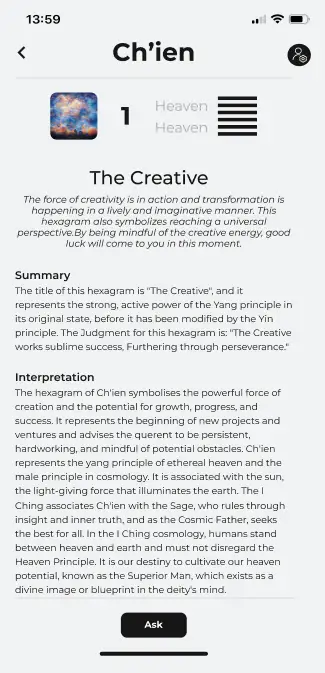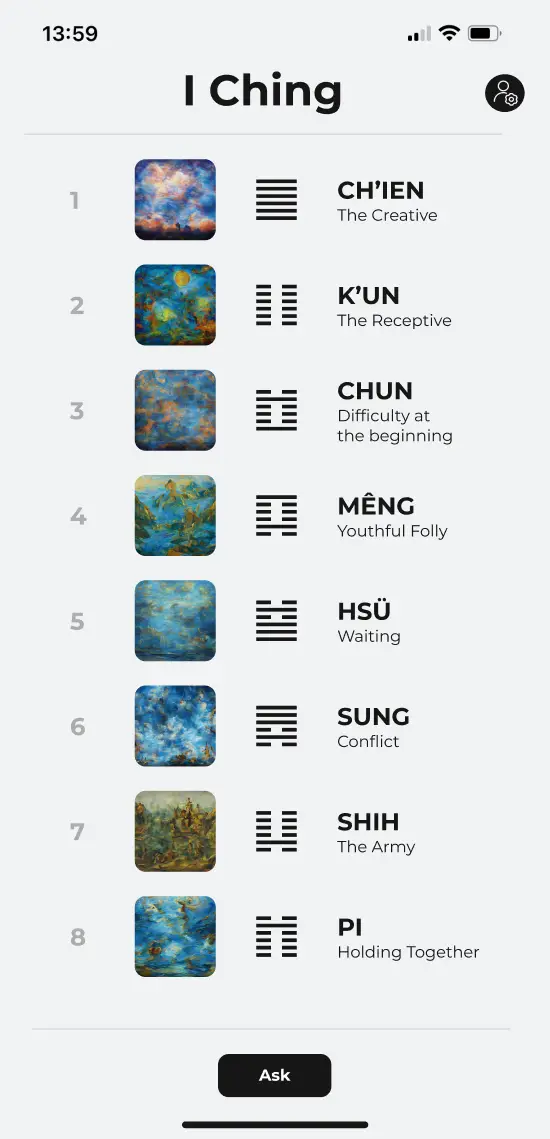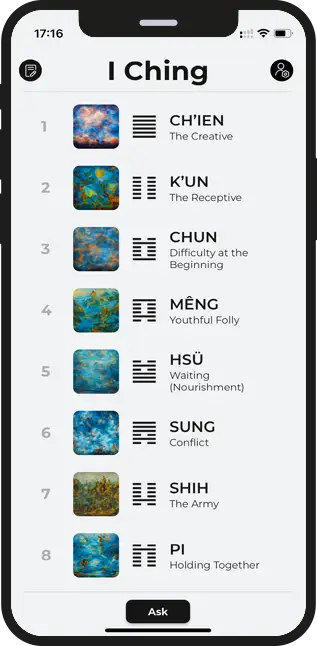
Mountain
Heaven
Hexagram 26 - The Taming Power of the Great - TA CH’U
Navigating difficult situations as they become more intense requires a calm and centred approach. Staying still and centred can prevent further escalation and allow a clearer perspective on moving forward.
Summary
The hexagram represents the taming and harnessing of great power, both inner and outer. It symbolises the ability to control and channel one's strength and the power of the natural world for the benefit of oneself and others. The key takeaway from the judgment is to maintain inner balance and humility in the face of great power and to use it wisely and ethically. The image of the hexagram is the taming of a wild horse by a skilled rider.
Interpretation
Is a powerful message of inner strength and resilience in facing challenges and adversity. This hexagram acknowledges the natural buildup of tension during self-development and growth. It offers guidance for responding when faced with envy, doubt, fear, or other negative energies from others.
At the heart of this hexagram is the idea that developing inner power and independence can trigger envy in others, particularly those whose egos and fears are in control. This envy can lead them to test us, to see if they can drive us off-balance, make us doubt ourselves or become fearful. However, we remain steadfast in our inner independence and integrity. In that case, the testing will continue and culminate in a "crescendo-of-awfulness" - an almost unendurable tension - before it eventually ends.
To weather such a crescendo of awfulness, the hexagram counsels us to "hold still, hold firm, and hold together." Holding still refers to keeping our inner thoughts quiet and neutral, not seeking a comprehensive solution or knowing the outcome. Holding firm means not doubting our inner sense of truth or abandoning what we have learned from our experiences with the I Ching. Holding together means staying strong on others' superior potential and ability to perceive and correct their errors.
It is important to note that the hexagram warns against ego-generated barriers and demands, which can cause retaliatory responses and lead to inner lawsuits. When tense and trying situations occur, we should ask ourselves whether we carry grudges, harbour prejudices, or list demands that involve injured pride. If we do, we risk becoming defensive or aggressive, which is only bravado and will only undermine ourselves.
Instead, the hexagram advises us to be humble and use our power with moderation and wisdom to achieve a balance between our own needs and those of others. It suggests being patient and persistent in the face of resistance and being able to adapt to changing circumstances. By holding to what is correct in the face of pressure, we gain the strength and peace of mind of spiritual masters.
Ultimately, the message of Hexagram 26 is a call to action to purify our thoughts and actions, to be firm in our inner selves, and to embody the virtues of the I Ching in our daily lives. Through this, we can overcome even the most complex and challenging trials and achieve proper spiritual growth and enlightenment.
Sage Advice
Emphasises the importance of inner balance and self-control. This hexagram reminds us to take control of our internal "wildness" and strive for greater harmony within ourselves. By being persistent and patient in our efforts, we can achieve a more centred and balanced state of being. We must be compassionate towards ourselves and avoid being too hard on ourselves as we work towards inner balance.
Be patient and gather resources and strength before taking action. This hexagram reminds us that accumulating power and resources gradually, and taking a strategic approach, can lead to success. It's essential to be mindful of our actions and avoid wastefulness while focusing on self-improvement and conserving our energy for when the time comes to act. This hexagram also advises us to be open-minded and considerate of others and work in harmony and cooperation to achieve our goals.
The Sage emphasises the importance of self-discipline and strategic planning in achieving success and inner harmony. By focusing on these qualities, we can become more grounded and balanced individuals, better able to navigate life's challenges.
Line 1
Warns of danger and advises against rushing into conflict when our emotions are running high. The false dragon of fear and anticipation can lead us to act in inappropriate or even evil ways. Instead, we should take a step back and keep still, allowing ourselves time to regain our composure and centre our energy. This will enable us to resist the urge to act impulsively and avoid worsening the situation. By enduring the difficulty with restraint, we create the space for those responsible for correcting themselves, and the resolution to the problem will come sooner. We should remember to rely on the Unknown and trust that the right path will be revealed. This way, we can avoid misfortune and find a way to move forward.
Line 2
In times of difficulty, it is natural to feel frustrated and want to push forward. However, this can lead to further obstacles and setbacks. Instead, it is better to accept the circumstances and refrain from acting impulsively. This requires self-discipline and patience, but it also allows for a buildup of creative energy that can be harnessed for future endeavours. The axletrees being taken from the wagon represent a temporary loss of momentum, but by remaining composed and focused, one can weather the situation and emerge stronger. The lesson of the second line is to trust in the process and have faith that the right opportunities will present themselves in due time.
Line 3
The path forward may seem blocked, but it is important to persevere with awareness of the danger. We must practice confronting the obstacles that hinder us and practising self-discipline, like the chariot driver who practices daily. By doing so, we can develop a more profound, intuitive knowledge of the correct response to adversity. We must also be willing to be led and to follow like a "good horse" rather than being stubborn and rigid in our emotions. Line three suggests that we can make steady gains by restraining our lower impulses and renewing our humility, neutrality, and innocence. This requires remaining vigilant against hindrances and not allowing ourselves to be worn down. By doing so, a way forward may open up to us.
Line 4
To have a meaningful impact on others, it's essential to control our unreasoning energy that arises from hidden emotions. When we act out of strong emotions such as desire, fear, or anger, we tend to press ourselves on others, and they remain unreceptive. By realising the futility of such efforts and putting a "headboard" on the energy generated by these emotions, we enable ourselves to withdraw and wait for the right time to have an effect. This requires us to still ourselves and let the door open of its own accord rather than trying to force our way in. When we act with a calm and understanding attitude, we will have great good fortune in achieving our goals.
Line 5
Restraining our desires and maintaining neutrality can positively impact the situation we are facing. It allows us to achieve inner freedom and independence, which can help us deal with challenges. The energy of desire can be overwhelming and disruptive, leading us to act impulsively and potentially worsen the situation. By holding back and not being controlled by our desires, we can approach the problem with a clear and level head, making it more likely that things will turn out for the better. The imagery of the tusk of a gelded boar suggests a force that has been tamed and rendered harmless, just as we can control and diminish the power of our desires through self-discipline. Good fortune comes from this self-mastery and the positive impact it can have on our situation.
Line 6
Represents the culmination of the hexagram's message. It suggests that success can be achieved when inner obstacles are overcome through modesty and perseverance. When these inner blocks are cleared, it releases creative energy, which can help correct the general situation. This line signifies a positive outcome and attaining the way of heaven.








